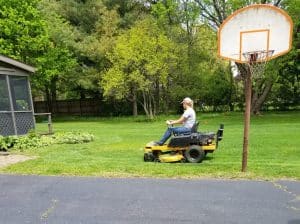Pregnancy is beautiful but scary, bringing a lot of emotions, from excitement to fear of the unknown, which leads to anxiety.
You will be unable to do many things while pregnant, and you should know these limitations for your safety and the baby’s; hence, can you ride a lawn mower while pregnant?
You can ride a lawn mower while pregnant, but take precautions to stay safe. Mowing your lawn while pregnant helps keep your grass neat and provides a fun way to exercise.
However, since pregnancies are different, it would be best to consult your doctor beforehand.
You shouldn’t mow your lawn if your doctor advises against it or your pregnancy is high risk. Moreover, always listen to your body and don’t disregard any pain or discomfort you experience.
This post explores the risks and benefits of riding a lawnmower while pregnant, so keep reading for a detailed description.
Can You Ride A Lawn Mower While Pregnant?
It’s generally safe to ride a lawn mower while pregnant as long as you do it carefully. Ensure you listen to your body, stop mowing if you feel any discomfort and pain, and take precautions to prevent dehydration, increased exposure to allergens, and avoid heat exhaustion.
In addition, riding or pushing a lawnmower is a terrible idea if your pregnancy is high risk or your doctor advised against it. In that case, leave lawn work to another family member, ask a friend to help you, or hire a professional.
Ensure you have an excellent lawnmower with a sharp blade and put on suitable clothing, including closed-toe shoes, long pants, and gloves.
Furthermore, don’t cut your grass in direct sunlight or when it’s hot because that will put you at risk of dehydration.
You must also pay attention to your surrounding to avoid falling off your mower or bumping into obstacles. Additionally, drink lots of fluids and rest in between mowing.
Also Read: Best Lawn Mower For Women
Why Mowing The Lawn Can Be Beneficial During Pregnancy
Mowing the lawn during pregnancy can be beneficial for some pregnant women, but it’s important to consider individual health factors and consult with a healthcare provider before doing any strenuous activity during pregnancy.
Here are a few potential benefits of mowing the lawn during pregnancy:
1. Physical activity
Mowing the lawn can be a good form of exercise and help pregnant women stay active. Moderate exercise during pregnancy can help improve circulation, prevent excessive weight gain, and reduce the risk of gestational diabetes and high blood pressure.
2. Sunlight Exposure
Spending time outside in the sun can help boost vitamin D levels, which is important for fetal bone development and can help prevent conditions like rickets in the baby. However, it’s important to wear sunscreen and protective clothing to avoid skin damage.
3. Stress Relief
Spending time outdoors and getting physical activity can help reduce stress and improve mood during pregnancy. This can help reduce the risk of conditions like depression and anxiety.
Mowing The Lawn At Different Pregnancy Stages
The more your pregnancy progress, the more restricted you will be, so let’s see what mowing the lawn looks like at different stages of your pregnancy.
10 Weeks
You may have found out that you are pregnant or still oblivious of the child growing inside you. Therefore, you could be carrying on with your everyday life or getting quite proactive.
It’s perfectly acceptable to mow the lawn during the early stages of your pregnancy but follow the safety precautions. Consider getting an electric lawnmower to avoid inhaling fumes from a petrol lawnmower.
20 Weeks
You are likely beginning to have a baby bump at this stage as you approach the halfway point of your pregnancy and experiencing pregnancy-related changes. Nonetheless, you can effortlessly mow the lawn if you are motivated enough and follow the precautions.
30 Weeks
You will have a sizeable bump now and experience the challenges of pregnancy, including feeling fragile, sore, and tender. While you can still mow your lawn, it would be best to use a ride-on mower to avoid the strenuous work of pushing, carrying, and maneuvering a push lawnmower.
34 Weeks
With six weeks remaining until your due date, maintaining a neat lawn shouldn’t be your priority, so you can forgo mowing.
However, you can still do it without harming yourself and the baby if you are up for it, but don’t cut the grass for over 30 minutes straight, and make sure you take breaks.
If the whole lawn cannot be mowed within 30 minutes, split the work; no one said you must cut all the grass in a day.
36 and 37 Weeks
Monitoring your hydration, overexertion, and overheating is of utmost importance when mowing during these weeks.
38, 39, and 40 Weeks
You will need to take plenty of breaks when mowing and make sure you don’t push your body too hard. Ensure you stay hydrated, your heart rate doesn’t go beyond 140, and maintain a nice body temperature.
NOTE:
Regardless of how far along you are, stop mowing if you feel exhausted, uncomfortable, or start feeling different. Monitor yourself and err on the side of caution.
Risks To Be Aware Of While Mowing A Lawn While Pregnant
Despite mowing while pregnant being generally safe, it isn’t risk-free, and it’s essential to beware of them to protect yourself and your baby. These risks are:
1. Overheating And Dehydration
Overheating occurs when your body is unable to cool down fast enough, and it’s the primary cause of heat exhaustion and heat stroke.
You are more vulnerable to these conditions when pregnant, particularly if you work on hot days.
Dehydration and overheating can make you faint or feel dizzy, and if you fall, you risk facing early-onset labor or placental abruption.
This is why it’s essential to mow during cool days and take breaks frequently.
2. Lawnmower Fumes
Gas-powered mowers release carcinogenic fumes that can damage your health and the baby. It’s advisable to cut grass with an electric mower when pregnant, but if you use a gas-powered model and start feeling nauseous, lightheaded, or dizzy, stop mowing and seek medical attention.
3. Allergen Exposure
Pregnancy can intensify your allergies or make you develop new ones, and since common allergens are substances found outdoors like grass and pollen, mowing can expose you to them.
Ensure you monitor the natural responses of the body while cutting grass and seek medical attention if you develop allergy symptoms.
4. Breaks, Fractures, And Cuts
You can suffer fractures, broken bones, and cuts from using a misused or broken lawnmower. This can also lead to a significant trauma that can cause a miscarriage or injure your baby or you.
Make sure your lawnmower is in excellent condition, comfortable to use, and you have experience using a mower.
5. Wet Grass
You risk falling and hurting yourself by mowing a wet lawn.
6. Steep Hills
The risk of falling and incurring injuries or worse, a miscarriage is high when mowing a yard with uneven terrain.
Frequently Asked Questions
Can Riding A Lawnmower Cause A Miscarriage?
You risk a miscarriage when mowing if you overexert yourself, overheat/become dehydrated, or use an excessively bumpy ride-on mower. Falling while cutting grass can also lead to a miscarriage.
Can Mowing The Lawn Induce Labor?
The strenuous work surrounding lawn mowing can induce labor, just like walking. It’s believed that riding bumps while pregnant excites the baby to come out, and that can be done with exercise balls, driving on a bumpy road, or even mowing the lawn.
The bumping is thought to create rhythmic pressure on your baby’s head, stimulating the release of oxytocin, the hormone that controls contractions, thus stimulating your cervix into labor.
Conclusion
Mowing while pregnant can be good for your general well-being if carefully done since it offers mild exercise.
However, your safety and that of your baby’s come first, so don’t overexert yourself; your grass can wait if you are not up for the task.

Hey there, I’m Derek Schew, a writer for Lawnholic.com, where we cover everything and anything related to lawns. As someone who’s spent countless hours tending to my own lawn, I’m passionate about sharing my knowledge and helping others achieve the perfect yard. From lawn care tips to product reviews, I’m committed to providing our readers with the most accurate and up-to-date information available. So whether you’re a seasoned lawn enthusiast or just getting started, I invite you to join our community and discover the joys of a lush, green lawn.

